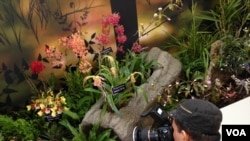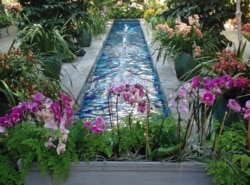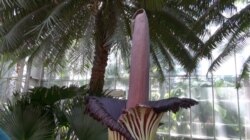Visitors come to the United States Botanic Garden in Washington, D.C. to enjoy many different plants, and the peace of nature.
Anna Pavlova works nearby. She likes to come on short breaks during her workday, to find some peace.
“It feels like a forest in a city so I can be thinking about something else besides work for even five minutes which is sometimes very nice.”
This year, the U.S. Botanic Garden celebrates its 200th anniversary. It was founded by two U.S. Presidents; George Washington and Thomas Jefferson. Established in 1820, the Garden collects and grows plants. Its mission is to demonstrate the aesthetic, cultural, economic, therapeutic and ecological importance of plants to the well-being of humankind.
The Garden on the National Mall is just down a hill from the U.S. Capitol building. The garden is made up of 65,000 indoor and outdoor plants. Some are more than 165 years old. Workers document and care for the plants. They are shared with the public for study purposes as well as pleasure.
The Garden’s conservatory, or greenhouse is a beautiful glass and steel building. Sunlight floods in, helping the plants grow. Rooms inside are home to plants that do well in different environments. For example, there is the warm and damp tropical room as well as the one that has desert conditions.
Saharah Moon Chapotin is Executive Director of the U.S. Botanic Garden.
She told VOA that "we still have a very important role to play in educating people about the importance of plants.” She said this is especially true for people who live in cities, and may not have a connection to a farm, or clearly understand where food comes from.
The newest exhibit, “Deeply Rooted, Branching Outward” covers the scientific exploration of plants. Chapotin hopes the garden will give visitors a “greater appreciation for plants,” and how they help with every part of our daily lives.
Among the garden’s most loved plants are the 4,000 orchid that come from around the world. During the spring orchid show each year, many flowers bloom, including some that are endangered.
During the Christmas season, a very popular exhibit has toy trains on tracks, moving through plants and structures made from plant-based materials.
Another popular event at the Garden is the flowering of the rare, huge “corpse flower.” It can go years in between blooms. The plant can grow to over 8 feet tall, and it known for its horrible smell—sometimes described as the smell of death.
Something decidedly sweeter is the smell of roses when the weather turns warm in Washington, D.C. Many varieties and colors of these beautiful flowers, along with other outdoor plants, bloom at the Garden when warm weather and sunshine comes to town.
That is when you find visitors and workers taking a break, walking the outdoor paths, looking at the water structures, and maybe even stopping to smell the roses.
I’m Anne Ball.
Deborah Block reported this story for VOA News. Anne Ball adapted it for VOA Learning English. Caty Weaver was the editor.
We want to hear from you. Write to us in the Comments Section.
________________________________________________________________
Words in This Story
aesthetic – adj. of or relating to art or beauty
therapeutic – adj. producing good effects on your body or mind
appreciation – n. a feeling of being grateful for something
endangered – adj. used to describe a type of animal or plant that has become very rare and that could die out completely
bloom – v. to produce flowers







